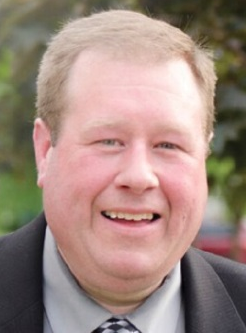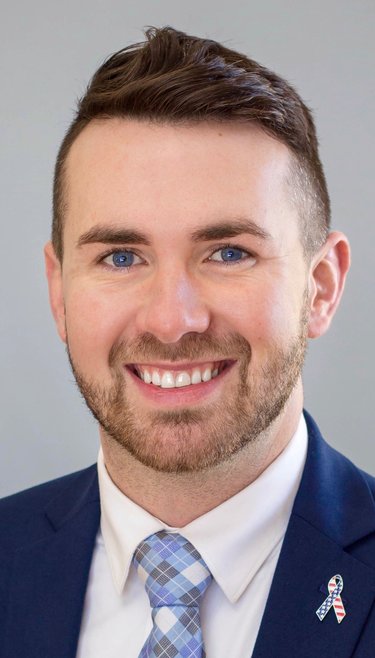Tague, O’Connor at it again
Two candidates who were neck-and-neck in a special election five months ago are again running to represent the 102nd Assembly District that was vacated by Republican assembly member Peter Lopez this spring.
Chris Tague, a Republican and former supervisor of Schoharie, won the spot by 159 votes in a special election in April of this year in a district where 35 percent of voters are enrolled as Republicans, and 28 percent are enrolled as Democrats — 26 percent are not enrolled in any party and the rest are enrolled in small parties. About 10 percent of the April vote went to a third-party candidate, Wesley Laraway, who is not running in the November election.
Tague’s Democratic opponent, Greene County Legislature minority leader Aidan O’Connor, hopes to take the lead this time.
The 102nd District includes all of Schoharie and Greene counties, and parts of Albany, Columbia, Ulster, Delaware, and Otsego counties. In Albany County, it includes the towns of Coeymans, Rensselaerville, and Westerlo.
Tague has lived in the town of Schoharie his whole life, and previously ran his own dairy farm and managed a quarry before he ran for supervisor and won in 2015. In April, he described his term as supervisor as an example of his use of public and private connections to bring businesses to the town, such as reopening a feed mill by bringing in an outside company and funding repairs with state grants.
The April election took place after Lopez resigned in order to work for the federal Environmental Protection Agency. Tague said he worked closely with Lopez on his campaigns and was encouraged by him to run. Tague has quipped that he started in politics at age 12 when he helped his grandfather run for a local office.
After serving as an assemblyman, Tague says he enjoys the job but is disappointed by bills being stalled by what he attributes to political divides, such as a bill requiring term limits for legislators that he co-sponsored that was held up in committee. He later stressed his work to expand rural broadband in the state and requesting the Food and Drug Administration reclassify plant-based drinks like soy milk and almond milk not as milk.
Tague has raised $33,015 since the April 24 election, according to the New York State Board of Elections. Of these donations to the “Friends of Chris Tague,” eight of these are more than $1,000, the largest amount being $3,000 donated by Marjorie Becker, the 96-year-old chief executive officer of the broadband company MidTel, which Tague has worked with to expand to parts of his district like Westerlo. Rosemary and Gary Kochem, the retiring CEO of Albany Medical Center, donated a total $5,000 through five different donations. Other contributors of $1,000 or more are Hannay Reels CEO Eric Hannay; Carver Construction — John Brust, a partner in the company Delaware Engineering; and $1,000 from the Empire State Associated Builders and Contractors Political Action Committee.
O’Connor has raised $41,008 since the spring election; 11 donations to “Aidan for Assembly” are more than $1,000. The highest were $4,400 each from the artist Liliana Zavaleta and Steven Wiland, who shares her Milford address; Marisa Wiland of Philadelphia donated $3,200. A donation of $3,831 was unitemized. Crane Davis, who has been active in local initiatives like the Greene County Jail and tourism in his Palenville community, donated $2,000 and Anne Pirrone donated $1,000.
The other top donations came from organizations like $2,000 from both the Northeast Regional Council of Carpenters Non-Partisan PEC and the state Political Action Fund for the 1199 chapter of the Service Employees International Union; and $1,000 each from Capital Women Political Action Corporation, the Friends of Joyce St. George for Senate (a campaign for the New Kingston resident in the 51st Senate District), and the New York State American Federation of Labor and Congress of Industrial Organizations Committee on Political Education.
O’Connor is two years into his first three-year term for the Greene County Legislature, representing Durham, with a background in emergency response that has heavily influenced his policy-making. He started as a volunteer on the Greeneville Rescue Squad before becoming a paramedic for Greene County and later a flight paramedic for the company LifeNet.
He now works as a business manager there and continues to volunteer as a paramedic in Greenport, Columbia County, and to work as a paramedic instructor at the State University of New York college of Agriculture and Technology at Cobleskill.
He previously lobbied for laws increasing emergency responder members with the National Association of EMTs and as a legislator helped fund EMS services and healthcare classes and equipment for communities. As a state assemblyman, he said he would lobby for laws addressing issues facing paramedics and other emergency responders.
O’Connor believes that, with more time than he had to campaign in April, he will be able to take the lead on the Nov. 6 election.
The two-year term has a salary of $79,500 a year.
Chris Tague
Chris Tague said he does not support a plan to provide state-sponsored universal healthcare.
“Government is not the answer to running healthcare,” he said.
He referred to a projection that the state would lose $40 billion in Medicaid funding if such a program were implemented in New York State, and surmised that the additional costs would be borne by the taxpayers. The study was prepared by Manatt Health for the Coalition of New York State Public Health Plans — which represents eight insurance plans like Fidelis Care and MVP Health Care, covering about two-thirds of Medicaid and Child Health Plus recipients in the state.
Tague said that, while he cannot completely endorse it until he reviews it further, he would prefer a plan proposed by the Republican gubernatorial candidate, Marc Molinaro. Molinaro has said that municipalities and employers should have the ability to pool resources to buy insurance, and that geographic restrictions on where health insurance plans can be sold should be removed.
Molinaro has also proposed moving the costs of Medicaid from the county to the state in order to lower property taxes. Tague likewise said the issue lies in property taxes.
“The real problem in upstate New York is property taxes,” he said.
Tague said that, without looking at how other states perform using a single assessment standard, he could not say whether New York should do the same. He said that, while the state does have some culpability in assessment rates being skewed, he said that local governments need to look to their own role in fixing it.
Tague does not believe that the United States Supreme Court decision on Roe v. Wade will change, and said he has not seen state legislation regarding codifying Roe v. Wade. He said he could not answer a question about something he has not seen.
Tague said that he is a supporter of campaign finance reform, including closing the LLC loophole. He emphasized that campaigns need to be transparent about their funds, and noted that a bill he has co-sponsored would put forth further restrictions on campaign contributions.
“If you can’t write a check to someone and their campaign and your name can’t be on it, then you shouldn’t write it,” he said.
Tague said that he still has questions that need to be answered before recreational marijuana is voted on, such as who would regulate the sale and use of it, how illegal growing would be prevented, and how to determine if someone is in a fit state to drive or care for a child (due to the ability for the substance to stay in one’s body for a long time despite the effects wearing off).
“I have seen no legislation right now with regards to legalizing [recreational] marijuana … ,” said Tague, adding later that the only literature he has seen from the government has been the Department of Health report. “I can’t vote yes or no.”
Tague said that he does support the state’s legalization of medical marijuana and believes it should be made more accessible and more easily prescribed. He also said that he supports allowing farmers to grow hemp in order to support agriculture in the state.
In order to continue fighting the opioid crisis, Tague believes more emphasis needs to be put on education, so that people like himself can understand the impact of opioid addiction, and so that those addicted know they can reach out to resources without legal penalties. He notes that he was in his 40s when he joined a committee in Schoharie County and he learned about the extent of the opioid crisis.
Tague said that he is a strong supporter of the Second Amendment and will not support what he described as further infringements on his constituents’ right to bear arms, which he said is integral to many upstate residents. He said that, should the opportunity present itself, he would vote to repeal the SAFE Act.
Aidan O’Connor
Aidan O’Connor believes New York should adopt a single-payer healthcare system so that anyone in the state could be insured. He said he recalls working as a paramedic and seeing that “too many individuals were terrified” of being charged for their medical care or ambulance ride.
He said, however, that the bill should be funded by income tax rather than property taxes so that the burden would be removed from the local government. The current bill states that New Yorkers would pay for insurance based on income, and that federal funds now received for Medicare, Medicaid, Family Health and Child Health Plus would be combined with the state revenue; the bill also states local Medicaid funding would be ended.
O’Connor said that he supports a woman’s right to choose. He said, “We should always make sure that we’re giving that decision … to a woman and to her family and not to the state.”
O’Connor said that he believes that there should be a system in place to regulate property assessment standards, if not statewide then regionally. He also said that there needs to be more support given to local governments so that they can better collect data on properties or shared services to provide for a more integrated computerized system for code-enforcement officers and assessors to use.
O’Connor said that he would absolutely work to close the LLC loophole in order to allow transparency in campaigns.
“The ability for bad money to come in is ridiculous,” he said.
O’Connor believes that recreational marijuana should be legalized, noting that other states like Colorado have seen economic benefits. Legalization would also allow marijuana to be regulated, he said. In his experience as a paramedic, he said, he has never seen someone suffering from using marijuana. He added that he would like to see more updated research on the uses of medical marijuana.
O’Connor also said that farmers should be allowed to grow hemp because it could be an economic stimulus for the agricultural market.
O’Connor believes more can be done to fight the opioid epidemic. On the local level, he said there should more classes offered on using naloxone, with the brand name Narcan, and expanded needle and medication drop-offs. He also said that the state should pursue legal action against pharmaceutical companies for their practice of overprescribing in the 2000s. O’Connor said, too, that inpatient services should be expanded to allow treatment for addicts that lasts for days or even weeks rather than being held overnight following an overdose.
O’Connor believes the SAFE Act was passed unfairly in a rushed manner in the middle of the night, but said that both sides of the gun-control debate need to be heard. He said that mental-health issues need to be addressed further, including potentially sharing services in order to provide more extensive services at the local level.




